
Friday, December 22

Contemporary Islamic Terrorism The roots of international Islamic terrorism can be found at first glance in the war in Afghanistan in the 1980's, a proxy war fought during the height of the Cold War. The Afghan mujahideen fought their holy war — jihad — with the help of the Wahhabi regime in Saudi Arabia and with the help of Pakistan. U.S. support was crucial during the war where the American services and most importantly the C.I.A. managed to promote the fighting capabilities of the "holy warriors" by transferring via Pakistan the necessary logistical and armament support. Over 40,000 mujahideen, gathered from Muslim states around the globe, fought in this war and some of them ultimately provided the human resources base for the terrorist organizations of the 1990's. World Press Org
Thursday, November 30
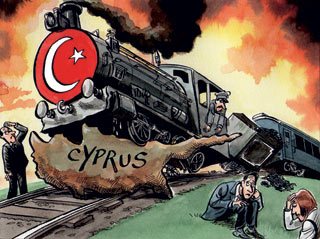
The Turkish train crash MELANCHOLY is Istanbul's defining characteristic, writes Orhan Pamuk, Turkey's Nobel prize-winning novelist. And melancholy has now descended on the country's relationship with Europe. “Almost everyone I know has lost heart,” says Soli Ozel, a political scientist at Istanbul's Bilgi University who wants Turkey to join the European Union.
... It was always going to be difficult to get Turkey into the EU. On top of complications arising from its poverty, its mostly Muslim culture and its mistreatment of the Kurds, it would be the largest member, with the most votes in the Council of Ministers and the most seats in the European Parliament. Even so, the accession talks have been unnecessarily fraught.
... All this suggests that the quarrel is to do as much with the Europeans as with the Turks. In 2005 European political leaders agreed to negotiate Turkish accession in good faith, but it is not clear that all are doing so. Unwilling to admit that they want to keep Turkey out, France, Austria and Cyprus are making demands that seem designed to induce the Turks to walk away.
... For the EU, a rejection of Turkish membership would represent a huge lost opportunity. Europe's foreign policy, and its hopes of global significance, would suffer a catastrophic loss of credibility if it were seen to be blackballing a moderate Muslim country that has NATO's second-largest army. The EU's reputation in the Muslim world, which is watching the membership talks with Turkey closely, would sink, perhaps even below America's. Economist

Blood, tears and still no victory GEORGE BUSH returned to the Middle East this week a diminished figure. At home he has been thumped by the voters. In Iraq his dreams of an example-setting democracy have trickled away in blood. For all the brave words he exchanged with Iraq's prime minister, Nuri al-Maliki, in Amman at mid-week, it is widely assumed that his real aim now is simply to arrange a way for America to leave Iraq as soon as it decently can. Only then would the Republicans have a chance of retaining the White House in 2008. And only after it has left Iraq will America be able to restore its tattered influence in the wider Middle East.
Such, at any rate, is the conventional wisdom. But is it correct? And did anyone tell Mr Bush? The president certainly faces a daunting array of problems in the region. In this special section we look at four of them: actual civil war in Iraq, potential civil war in Lebanon, the stalemate in Palestine and the hostility of an Iran that seems intent on acquiring nuclear weapons. And yet despite all that has gone wrong in Iraq, America remains by far the strongest external power in the Middle East—and for the next two years Mr Bush will remain its president.
On his way to Amman, Mr Bush did not talk as if he felt like a weakling. He insisted at a NATO summit in Riga that American troops would not leave the battlefield until the mission in Iraq was complete. And after meeting Mr Maliki in Amman, he promised again that the troops would stay just as long as Iraq's government wanted them to. Liberty had to prevail in the Middle East, the president declaimed, “and that's why this business about graceful exit simply has no realism to it at all.”
Realism is in the eye of the beholder. The fact that Mr Bush met Mr Maliki in Jordan's capital rather than in Baghdad highlights how anarchic Iraq has become. Most of Iraq's politicians claim to want the same thing America wants: a united, non-sectarian state and an end to the violence that has killed tens of thousands in the past year alone. But with a diffuse network of Sunni guerrillas pitted against equally disorganised Shia militias, nobody has the authority to deliver. The governments that are party to the conflict, in Iraq and beyond, are several steps removed from the actual killing: all they can do is to cajole others to cajole the armed groups.
Mr Maliki succeeded in pressing Mr Bush to allow more Iraqi soldiers to come under his direct control. At present most of them answer to the American chain of command. But this will not have a huge impact on the ground. Building up the Iraqi army, which suffers badly from ill-discipline and sectarian tensions but still appears to respond, more or less, to the prime minister's orders, is taking time. “It's not easy for a military to evolve from ground zero,” Mr Bush conceded.
Another basic problem is the domestic political weakness of Mr Maliki. After their meeting, Mr Bush said that the Shia prime minister was “the right guy” for Iraq and that it was in America's interest to help him. Privately, however, the Americans are increasingly unhappy about supporting a government that does not appear to be making enough effort to restrain Shia militias and reach out to the Sunnis
Behind the scenes, Mr Bush probably tried to encourage Mr Maliki to detach himself from Muqtada al-Sadr, the radical Shia cleric whose followers are believed to be responsible for a large share of the sectarian killing. Mr Maliki, however, needs Mr Sadr, who is one of the few leaders to have any influence over the Shia sectarian gangs, most of which claim association with his Mahdi Army but in practice operate autonomously. The young firebrand does appear to be doing a bit to restrain his more out-of-control followers.
Before the summit, the New York Times published a leaked memo written by Stephen Hadley, Mr Bush's national security adviser, saying of Mr Maliki that he “wanted to be strong but was having difficulty figuring out how to do so”. The memo emphasised Mr Maliki's need to put some distance between himself and Mr Sadr. Mr Sadr is meanwhile putting pressure on Mr Maliki to distance himself from the Americans. After a triple car-bombing in the Mahdi Army's east Baghdad support base of Sadr City killed more than 200 people last week, Sadrist officials said that the Americans were primarily to blame for failing to provide security. They threatened to pull out of the government if Mr Maliki went through with his meeting with Mr Bush, though in the event, the Sadrists merely “suspended participation”, a good step short of a full walk-out.
In Washington, debate is transfixed on the report expected next week from the Iraq Study Group, a bipartisan committee promising sagacious advice on how America can best extract itself from the quagmire (see article). One much-leaked idea is said to be for American talks with Iran and Syria about how they could help calm Iraq, perhaps in the context of a regional peace conference that would touch on Palestine too. But Iran and Syria do not feel they need America's invitation to become involved. Syria established formal ties with Baghdad last week after a break of 25 years. This week, Iraq's president visited Tehran (see article) while Mr Maliki was packing for Amman. Iraq's neighbours have their own interest in limiting the chaos. That does not make them eager to help America. And nor did Mr Bush say anything in Amman to suggest that he is in the market for that “graceful exit”. Economist

Generation Dem The midterm elections of 2006 may be among the most momentous in two generations -- if their trends carry through the 2008 presidential election and beyond. These changes include a Democratic Congress that reflects a more politically cohesive national majority than any previous one; shifts of crucial constituencies that may represent a decisive repudiation of the Republican Party in its current incarnation; and the emergence of a younger generation that is overwhelmingly Democratic Salon
Friday, November 17
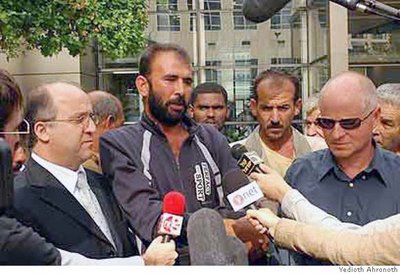
Heart-broken victims united in bid for peace Father of captured Israeli consoles Palestinians at hospital In a moving scene of reconciliation and hope, the father of the Israeli soldier whose capture started the current round of fighting in Gaza visited a Tel Aviv hospital Thursday to see Palestinians injured in last week's Israeli bombardment of Beit Hanoun. And two Palestinians whose families were decimated by the attack joined Noam Shalit in offering prayers for peace between Israelis and Palestinians, the recovery of the injured and an end to the holding of his son. SF Gate
Monday, November 13

Neoconservatism -- RIP
The moralistic ideology has utterly failed. But as long as Bush still abides by it, his disastrous "war on terror" will drag on.
Nov. 14, 2006 | The neoconservatives who dreamed up America's Iraq nightmare are rushing desperately about, searching for scapegoats. Their favorite whipping boy is yesterday's jutting-jawed hero, Donald Rumsfeld, who has been unceremoniously tossed onto the scrapheap. But they also blame the National Security Council, Condoleezza Rice, George Tenet, Paul Bremer, Gen. Tommy Franks and George W. Bush himself. The only thing they don't blame is the actual culprit -- neoconservative ideology itself.
The neocon finger-pointing over who lost Iraq, recently showcased in Vanity Fair, obscures the fact that Bush's war was a laboratory in which their doctrine was tested -- and completely failed. This failure was manifested on the ground and confirmed by the midterms. Most Americans don't even know what neoconservatism is, but they know a failure when they see it -- and they decisively rejected it.
Unfortunately, Bush himself and the key figures in his administration continue to cling, with the fervor of true believers, to neoconservative ideology. Bush has taken some potentially positive steps, like dumping Rumsfeld and replacing him with the more pragmatic Robert Gates, and saying he's open to "any idea" on Iraq. And he is now under enormous pressure, not just from Democrats but also from his own party, to implement profound changes in his Middle East policies. But it remains doubtful whether a figure as dogmatic and inflexible as Bush, who regards his "war on terror" as a sacred duty, will be able to change his approach. It is essential that the fundamental failure of neoconservatism be recognized, to prevent more foreign policy debacles like Iraq.
Neoconservatism is a notoriously slippery and hard-to-define term, in part because its definition has shifted as its enemies have changed. The first generation of neoconservatives, including Sen. Henry "Scoop" Jackson, Irving Kristol and Norman Podoretz, were former liberals who believed that America needed to stand up and fight communism. Accusing their former colleagues on the left of going soft, they claimed that America's survival and the fate of the free world required toughness, not compromise. (Kristol defined a neoconservative as a "liberal mugged by reality," which goes a long way to explaining why the ideology gained new adherents after 9/11.) The second generation of neocons, including Robert Kagan, William Kristol and Paul Wolfowitz, continued to believe in American exceptionalism and the virtues of force, but they added an idealistic note: America should not just battle evil but also promote democracies around the world. The "good" they sought, however, was not purely altruistic but inseparably bound up with America's self-interest. They wanted America to exercise "benevolent global hegemony." It was axiomatic that what is good for America is good for the rest of the world.
In 1997, many leading neocons started a pressure group called the Project for the New American Century, which called for America to overthrow Saddam Hussein. A number of PNAC members, including Rumsfeld, Wolfowitz, Elliott Abrams and Richard Perle, went on to hold high positions in or to function as influential advisors to the Bush administration.
One of the reasons the neocons were obsessed with Iraq, as George Packer points out in his brilliant study of the Iraq war, "The Assassins' Gate," is that they "concluded it would be very good for Israel." Many neocon thinkers were closely associated with Israel's right-wing Likud Party; some went on to write a 1996 paper, "A Clean Break: A New Strategy for Securing the Realm," that urged incoming Israeli Prime Minister Benjamin Netanyahu to roll back Syria, work to effect regime change in Iraq, and refuse to return the occupied territories to the Palestinians.
The neocons' attachment to the Israeli right naturally carried with it a whole series of assumptions about the Middle East, about terrorism, about Arabs, about the Palestinians, about Islam, and about how American should conduct its Mideast policy. The neocons, following the eminent pro-Israel Arabist Bernard Lewis, argued that the Arab world had only itself to blame for its backwardness. The Israeli-Palestinian conflict was trotted out by a moribund Arab culture as an excuse. In any case the Palestinians had lost any moral claim because of their recourse to terrorism. America should stop trying to placate the Palestinians and impose a Pax Americana on the region. The Arabs, who respected only force, would fall in line.
Under Bush, these assumptions became U.S. policy -- notwithstanding their significant departure from traditional U.S. Mideast policy, which at least made a pretense of being even-handed. And neoconservative beliefs are enshrined in the Bush administration's "war on terror."
Bush's "war on terror" follows the neocon playbook in every particular. The salient features of that war are these: 1) "Terrorism" is itself the enemy. It is soft-minded and immoral to consider historical context or grievances. Any group that practices terrorism is to be smashed into submission. 2) All militant Islamic groups, from al-Qaida to Hamas and Hezbollah, are essentially the same. They all subscribe to a totalitarian ideology and must be destroyed. 3) Force works. If you smash the Arab world in the mouth hard enough, it will get the idea. If it doesn't, it will be necessary to continue smashing it indefinitely. 4) The Israeli-Palestinian conflict is not that important, and the United States should not interfere with Israel's actions, however harsh. 5) The war on terrorism is so crucial that it merits suspending civil liberties, establishing secret prisons and renditioning suspects to be tortured.
This approach has been a colossal failure on every level. Iraq speaks for itself. The issue that most inflames the Arab-Muslim world against America, the Israeli-Palestinian crisis, is at one of its bleakest moments. The United States is more hated in the region than ever before. Hezbollah emerged stronger after Lebanon's war against it, and its leader, Sayyed Hassan Nasrallah, is the most popular figure in the Arab world. Iran has been greatly empowered. Arab moderates have been marginalized, afraid to be associated with the United States. Arab despots in "moderate" states like Egypt are increasingly threatened by Islamist parties. Afghanistan, which was never properly secured, is falling back into chaos. And as the National Intelligence Estimate pointed out, Bush's Iraq war has greatly increased the number of terrorists.
These are the achievements of the neoconservative approach to Mideast policy. And the problem is not, contrary to neocon claims, simply that Bush failed to properly execute the "war on terror." Well before the Iraq war started, many critics, including this writer, argued that the neocons' good vs. evil worldview was simplistic and dangerous, and that the Bush administration's approach to the Middle East was wrongheaded and if implemented would severely injure U.S. interests. It is no pleasure to be proved right at the cost of America's standing in the world. But as Republican and Democratic policymakers alike try to figure out how to salvage something from the Iraq debacle, it is essential that they also insist on a fundamental reorientation of America's Mideast policies -- and throw neoconservatism into the trash can.
The Bush administration used the shock of 9/11 to convince Americans that radical Islam was evil and that it was our calling to fight it to the death. Bush still believes this. No one disputes that what happened to America that day was terrible, or that terrorism is immoral. But the Iraq war decisively proved that these ethical truisms do not serve as a sufficient basis for foreign policy. You not only have to fight terrorism, you have to fight it smart. But in large part because of their ideological blinders about the Arab world -- dismissal of its grievances, failure to know its history, arrogant assumptions about what it "needed" to develop -- the neocons fought it crudely and stupidly.
The invasion of Iraq was the crowning glory of the neocons' great crusade. Yes, there were some genuine fears about Saddam's WMD, but those were secondary to the Bush administration's desire to smash the pathological Arab-Muslim world in the face (any face would do, and Saddam's was handy) and teach it a lesson it would never forget. Pro-war New York Times pundit Thomas Friedman summed up the neoconservative motivation for invading Iraq succinctly: a "terrorism bubble" had built up in the Arab-Muslim world, and we were going to burst it. Good would triumph and evil would be defeated. Beatings would continue until morale improved. America would show the rest of the world who was boss -- but we would be a benevolent boss, a disappearing boss, installing democracies in the Middle East and then pleasantly fading away to enjoy low oil prices and the glow of knowing that you can do well by doing good. As a bonus, the destruction of Saddam's regime, and the threat to do the same to the other regional evildoers, Syria and Iran, would force the Palestinians, deprived of their backers, to make peace on Israel's terms.
That was the hypothesis -- one that should never have left the ivy-covered walls of Neocon U. When it was field-tested using bullets and bombs in Iraq, not freedom and the triumph of the good but a witches' brew of violence and hatred bubbled up.
And what is likely to be the outcome in Iraq? The best-case scenario may be that we end up with an state run by an unpredictable Shiite strongman like Muqtada al-Sadr, whose rhetoric would be aggressively Islamist, anti-U.S. and pan-Arab but who might be willing to sell us oil. From a realpolitik standpoint, this would arguably be a worse outcome than if the nasty but non-ideological Saddam were still in power. And this is the best-case scenario.
The point is not that the Middle East is a hopeless, primitive mess, where tribal loyalties and the culture of revenge run so deep that it's better to stay away. That kind of Orientalist thinking -- which is now beginning to be heard again from disillusioned neocons on right-wing Web sites -- is too facile. The point is that the Middle East is far more complex in every way than the neoconservatives ever acknowledged. Take "terrorism," that bogeyman of neocon moralists. Both the Iraq mess and Israel's conflict with the Palestinians prove that reifying terrorism as an absolute evil, and basing foreign policy on defeating it without regard to the grievances or historical context out of which it comes, is self-defeating. As everyone who has studied terrorism knows, powerless people turn to terrorism.
In the case of al-Qaida and other jihadists, who have no legitimate grievances, strategic thinking dictates that we take actions to dry up public support for them while employing specifically targeted campaigns against them.
So-called realism, despised by neocons as instrumental and Machiavellian, turns out to be more effective, because more flexible, than the explicitly moralistic ideology of neoconservatism. At some deep level, the American people recognize this. The election was a repudiation, whether fully conscious or not, of lofty moral slogans and hysterical military crusades, and a demand that we take smaller steps. The heady days when neocons David Frum and Richard Perle could issue a book called "An End to Evil" are gone. Americans are at bottom pragmatists, and they now understand that the Middle East is not as black-and-white as Bush and the neocons insisted. Of course there are clear-cut bad guys, like al-Qaida. But the Bush administration's neocon attempt to link al-Qaida to every other militant group in the area we don't like is falling on increasingly deaf ears. It sounds too much like the same grandiose rhetoric used to justify the Iraq disaster.
The American people are not going to sign off on a new war against Iran or commit troops to battle Hezbollah. This isn't "appeasement" -- it's common sense. If the neocons still want to accuse their opponents of being appeasers, as they sit atop a pile of more than 2,800 American dead and hundreds of thousands of slain Iraqis, let them.
The neoconservatives' moment in the sun may have been cathartic for those Americans who wanted a credo that would echo their self-righteous rage. But it has left America despised and weakened globally, strengthened our enemies, and divided our country. It's time to put the crusaders' banner away.
Salon
Saturday, November 11

Doctor Who octor Who is a long-running British science fiction television programme produced by the BBC about a mysterious time-travelling adventurer known as "The Doctor", who explores time and space with his companions, fighting evil. It is also the title of a 1996 television movie featuring the same character.
The programme is listed in the Guinness Book of World Records as the longest-running science fiction television series in the world[1] and is also a significant part of British popular culture.[2][3] It has been recognised for its imaginative stories, creative low-budget special effects during its original run and pioneering use of electronic music (originally produced by the BBC Radiophonic Workshop). In Britain and elsewhere, the show has become a cult television favourite on a par with Star Trek and has influenced generations of British television professionals, many of whom grew up watching the series. It has received recognition from critics and the public as one of the finest British television programmes, including a BAFTA Award for Best Drama Series in 2006. Wikipedia
Friday, November 3

The antiwar GIs Today, there are echoes of the Vietnam experience in the protracted Iraq war -- including a growing protest movement in the military. Its trappings are starkly different this time. Rather than insubordination and violence, it has formed around a form-letter campaign, presumably conducted within the bounds of military regulations that restrict what soldiers are allowed to say. Last week, a group of current troops, with support from a handful of antiwar organizations, announced plans to petition Congress with a collection of "appeals for redress," which call for an immediate withdrawal from Iraq Salon
Thursday, November 2

Only 50 years left' for sea fish There will be virtually nothing left to fish from the seas by the middle of the century if current trends continue, according to a major scientific study.
... Bigger vessels, better nets, and new technology for spotting fish are not bringing the world's fleets bigger returns - in fact, the global catch fell by 13% between 1994 and 2003.
Historical records from coastal zones in North America, Europe and Australia also show declining yields, in step with declining species diversity; these are yields not just of fish, but of other kinds of seafood too.
BBC News
Wednesday, November 1
Alcohol-related deaths have risen by nearly one third in recent years. Among women, the figure has doubled within a decade. Helsingin Sanomat

UK youths 'among worst in Europe ...Measured against German, French and Italian youngsters, British 15-year-olds are drunk more often and involved in more fights, and a higher proportion have had sex.... Britons are also more immersed in consumerism than American youngsters, the research claimed. BBC News

Substance in Red Wine Could Extend Life, Study Says (A) report, published electronically today in Nature, implies that very large daily doses of resveratrol could offset the unhealthy, high-calorie diet thought to underlie the rising toll of obesity in the United States and elsewhere, should people respond to the drug as mice do.
Resveratrol is found in the skin of grapes and in red wine and is conjectured to be a partial explanation for the French paradox, the puzzling fact that people in France to enjoy a high-fat diet yet suffer less heart disease than Americans. NY Times
Tuesday, October 31

'New' Europe Reunites With Its Old Demons
The West introduced market capitalism in central Europe immediately after the fall of the Berlin Wall. Those ruthlessly implemented neoliberal economic policies today have destabilized the region. .. Nearly 17 years after the fall of the Berlin wall, we witness the rise of nationalism, xenophobia, and anti-Semitism in the "new" Europe; those ghosts that have haunted the region historically are back again... World Press Org

Water Is Running Out: How Inevitable Are International Conflicts? The world's population is growing and water consumption is increasing, but water resources are decreasing. "The world is running out of water," stated Tony Clarke and Maude Barlow, activists and experts on water issues, in their article "Water Wars," published by the Polaris Institute in 2003. They said that by 2025, world population would increase to 2.6 billion more than the present day and water demands would exceed availability by 56 percent. People will live in water-scarcity areas, and disputes over resources are inevitable. World Press Org

Trick or Treat? For Many Britons, the Reply Is Neither ... It is ... a rude culture shock for a generation of older people whose need for a macabre fall festival was traditionally satisfied by Bonfire Night. That holiday is celebrated by building a fire around a homemade effigy of Guy Fawkes, the Catholic perpetrator of the failed plot to blow up Parliament in 1605, and shouting happily as it burns to a crisp. Fireworks are set off, sausages are eaten, and some people toss effigies of unpopular politicians on the fire for good measure. NY Times
Tuesday, October 24

Staying the course is no longer an option There are no good options left in Iraq. To those who have lived through the daily carnage wrought by organized criminals, sectarian militias and jihadist terrorists, the idea that the U.S. can prevent a full-scale civil war--let alone transform Iraq into a stable democracy--has been dead for months. The main question is, How long will it take for military officials in Iraq and policymakers in Washington to concede that the whole enterprise is closer to failure than success? Time By APARISIM GHOSH / BAGHDAD
Saturday, October 21

Fortress Europe Fights Immigration Helicopters, boats, and planes were sent by EU member states to control the Southeast European costal border. But the new anti-immigration operation does not stop there: they work hand in hand with three Senegalese patrol boats and one plane. Their mission is clear: scan the coasts of Mauritania, Senegal, and Cap Verde, intercept "cuyucos," small fishing boats that can carry up to 50 to 70 people, and take their passengers home safe and sound. Operation Hera II conducted by the European border agency Frontex, cost four million euros, 80 percent of which is paid by the EU. World Press
Thursday, October 19

The Death of the Dead Sea The Dead Sea has fallen more than 20 meters over the past 40 years. Studies by scientists at the University of Jordan have shown that the sea now drops one meter in depth each year. World Press Review
Wednesday, October 18

The Worst Congress Ever There is very little that sums up the record of the U.S. Congress in the Bush years better than a half-mad boy-addict put in charge of a federal commission on child exploitation. After all, if a hairy-necked, raincoat-clad freak like Rep. Mark Foley can get himself named co-chairman of the House Caucus on Missing and Exploited Children, one can only wonder: What the hell else is going on in the corridors of Capitol Hill these days? The Rolling Stone
Monday, October 16

Legendary underground New York club closes after 30 years Described in 1975 by music magazine NME as ‘a toilet, an impossibly scuzzy little club’ and by its own admission ‘a small, dirty, beer-soaked, dark pit,’ CBGBs nonetheless earned a reputation as sacred ground for the punk generation. Khaleej Times
Wednesday, October 11

McCain the neoconservative Is John McCain, the current frontrunner for the Presidency in 2008, a hawkish neocon likely to push regime change? Or is he an ideologically more moderate figure, a realist with deep-seated skepticism about committing American troops overseas? What kind of president, in other words, would McCain be? The Rolling Stone
Tuesday, October 10


John Lennon's Killer Denied Parole Again The panel remains concerned about the bizarre nature of this premeditated and violent crime," the board wrote in a one-page decision issued shortly after Chapman's appearance before the three-member panel at Attica. SF Gate
The strange thing being that while Lennon's fans will never forgive, pardon or show mercy to Chapman, John probably would. We miss you John!
Saturday, October 7
Thursday, October 5

It's the coverup, stupid As Republican control of Congress in the midterm elections teeters on the precipice, the party leaders suddenly find themselves rediscovering the harsh reality of Richard Nixon's commentary on the Watergate scandal, that it's not the crime that kills you but the coverup. Salon
Wednesday, October 4

'Ancient light' takes Nobel Prize The CMB has been called the "echo" of the Big Bang - the event that created the Universe less than 14 billion years ago.
It is the radiation that formed when the Universe had cooled to such a degree that hydrogen atoms could exist. Before that time, scientists say, the Universe would have been so hot that matter and radiation would have been "coupled" - it would have been opaque. BBC
Tuesday, October 3

A Racial Rift That Isn't Black and White For centuries, the South has been defined by the color line and the struggle for accommodation between blacks and whites. But the arrival of hundreds of thousands of Hispanic immigrants over the past decade is quietly changing the dynamics of race relations in many Southern towns. NY Times
Monday, October 2
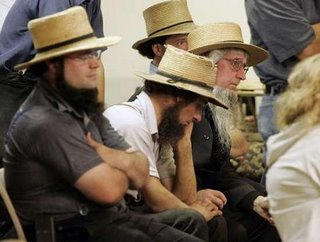
Violence not confined to Islam. Christian executes Girls in Paradise. A 32-year-old dairy truck driver killed at least three schoolgirls execution style and then shot himself dead after bursting into a one-room Amish schoolhouse in rural Pennsylvania... He was armed with an automatic handgun and a shotgun.. The Sydney Morning Herald
Robert Redeker, 52, a writer and high-school philosophy teacher who has been under police protection and in hiding with his family since the newspaper Le Figaro published his op-ed piece about Islam on Sept.19. Entitled "Faced with Islamist intimidations, what should the free world do?" Time
Sunday, October 1

Is the homeland where America's heart is? What kind of American are you? Red-state or blue-state? Secular humanist pinko or Bible-thumping loon? Tribe of Coulter or tribe of Franken? ..., one could say that old fires of tribal hatred (country vs. city, populace vs. elites) were rebuilt and carefully tended by politicians who could benefit from them. In that sense, what has happened in America in the last quarter-century is not altogether different from what has happened in the Balkans, the Middle East, Rwanda, Sudan and countless other exotic locations. The modalities of conflict are different, for the most part, and that's something to be grateful for. Salon


Song Search. Download. Listen. Vote!
Remember the last time you came upon a song you hadn't heard of before, a catchy tune that entered your head and refused to leave? The last time a fresh new sound seemed to open up the world just a little bit more? That's what Song Search is trying to find -- we want to unearth the greatest song you've never heard. Salon
Saturday, September 30

A Portrait of Bush as a Victim of His Own Certitude As this new book's title, (State of Denial), indicates, Mr. Woodward now sees Mr. Bush as a president who lives in a state of willful denial about the worsening situation in Iraq, a president who insists he won't withdraw troops, even "if Laura and Barney are the only ones who support me." (Barney is Mr. Bush's Scottish terrier.) N Y Times Books
Friday, September 29

Nato drawn into growing Russian spy row Georgian police continued to surround Russian army headquarters, renewing demands for the handover of a fifth officer accused of spying on Georgian military installations. However, Russia was defiant in its refusal to hand him over. Times
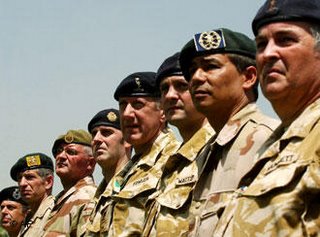
NATO to Broaden Military Operations in Afghanistan The agreement, endorsed at an informal two-day meeting of alliance defense ministers, would see some 12,000 US troops come under NATO control within Afghanistan's International Security Assistance Force within weeks. Deutsche Welle via World Press Review
Saturday, April 8
U.S. Study Paints Somber Portrait of Iraqi Discord
By ERIC SCHMITT and EDWARD WONG (New York Times)
WASHINGTON, April 8 — An internal staff report by the United States Embassy and the military command in Baghdad provides a sobering province-by-province snapshot of Iraq's political, economic and security situation, rating the overall stability of 6 of the 18 provinces "serious" and one "critical." The report is a counterpoint to some recent upbeat public statements by top American politicians and military officials.
The report, 10 pages of briefing points titled "Provincial Stability Assessment," underscores the shift in the nature of the Iraq war three years after the toppling of Saddam Hussein. Warnings of sectarian and ethnic frictions are raised in many regions, even in those provinces generally described as nonviolent by American officials.
There are alerts about the growing power of Iranian-backed religious Shiite parties, several of which the United States helped put into power, and rival militias in the south. The authors also point to the Arab-Kurdish fault line in the north as a major concern, with the two ethnicities vying for power in Mosul, where violence is rampant, and Kirkuk, whose oil fields are critical for jump-starting economic growth in Iraq.
The patterns of discord mapped by the report confirm that ethnic and religious schisms have become entrenched across much of the country, even as monthly American fatalities have fallen. Those indications, taken with recent reports of mass migrations from mixed Sunni-Shiite areas, show that Iraq is undergoing a de facto partitioning along ethnic and sectarian lines, with clashes — sometimes political, sometimes violent — taking place in those mixed areas where different groups meet.
The report, the first of its kind, was written over a six-week period by a joint civilian and military group in Baghdad that wanted to provide a baseline assessment for conditions that new reconstruction teams would face as they were deployed to the provinces, said Daniel Speckhard, an American ambassador in Baghdad who oversees reconstruction efforts.
The writers included officials from the American Embassy's political branch, reconstruction agencies and the American military command in Baghdad, Mr. Speckhard said. The authors also received information from State Department officers in the provinces, he said.
The report was part of a periodic briefing on Iraq that the State Department provides to Congress, and has been shown to officials on Capitol Hill, including those involved in budgeting for the reconstruction teams. It is not clear how many top American officials have seen it; the report has not circulated widely at the Defense Department or the National Security Council, spokesmen there said.
A copy of the report, which is not classified, was provided to The New York Times by a government official in Washington who opposes the way the war is being conducted and said the confidential assessment provided a more realistic gauge of stability in Iraq than the recent portrayals by senior military officers. It is dated Jan. 31, 2006, three weeks before the bombing of a revered Shiite shrine in Samarra, which set off reprisals that killed hundreds of Iraqis. Recent updates to the report are minor and leave its conclusions virtually unchanged, Mr. Speckhard said.
The general tenor of the Bush administration's comments on Iraq has been optimistic. On Thursday, President Bush argued in a speech that his strategy was working despite rising violence in Iraq.
Vice President Dick Cheney, on the CBS News program "Face the Nation," suggested last month that the administration's positive views were a better reflection of the conditions in Iraq than news media reports.
"I think it has less to do with the statements we've made, which I think were basically accurate and reflect reality," Mr. Cheney said, "than it does with the fact that there's a constant sort of perception, if you will, that's created because what's newsworthy is the car bomb in Baghdad."
In their public comments, the White House and the Pentagon have used daily attack statistics as a measure of stability in the provinces. Maj. Gen. Rick Lynch, a senior military spokesman in Baghdad, told reporters recently that 12 of 18 provinces experienced "less than two attacks a day."
Gen. Peter Pace, the chairman of the Joint Chiefs of Staff, said on the NBC News program "Meet the Press" on March 5 that the war in Iraq was "going very, very well," although a few days later, he acknowledged serious difficulties.
In recent interviews and speeches, some administration officials have begun to lay out the deep-rooted problems plaguing the American enterprise here. At the forefront has been Zalmay Khalilzad, the American ambassador, who has said the invasion opened a "Pandora's box" and, on Friday, warned that a civil war here could engulf the entire Middle East.
On Saturday, Mr. Khalilzad and Gen. George W. Casey Jr., the senior military commander in Iraq, issued a statement praising some of the political and security goals achieved in the last three years, but also cautioning that "despite much progress, much work remains."
Mr. Speckhard, the ambassador overseeing reconstruction, said the report was not as dire as its assessments might suggest. "Really, this shows there's one province that continues to be a major challenge," he said. "There are a number of others that have significant work to do in them. And there are other parts of the country that are doing much better."
But the report's capsule summaries of each province offer some surprisingly gloomy news. The report's formula for rating stability takes into account governing, security and economic issues. The oil-rich Basra Province, where British troops have patrolled in relative calm for most of the last three years, is now rated as "serious."
The report defines "serious" as having "a government that is not fully formed or cannot serve the needs of its residents; economic development that is stagnant with high unemployment, and a security situation marked by routine violence, assassinations and extremism."
British fatalities have been on the rise in Basra in recent months, with attacks attributed to Shiite insurgents. There is a "high level of militia activity including infiltration of local security forces," the report says. "Smuggling and criminal activity continues unabated. Intimidation attacks and assassination are common."
The report states that economic development in the region, long one of the poorest in Iraq, is "hindered by weak government."
The city of Basra has widely been reported as devolving into a mini-theocracy, with government and security officials beholden to Shiite religious leaders, enforcing bans on alcohol and mandating head scarves for women. Police cars and checkpoints are often decorated with posters or stickers of Moktada al-Sadr, the rebellious cleric, or Abdul-Aziz al-Hakim, a cleric whose party is very close to Iran. Both men have formidable militias.
Mr. Hakim's party controls the provincial councils of eight of the nine southern provinces, as well as the council in Baghdad.
In a color-coded map included in the report, the province of Anbar, the wide swath of western desert that is the heart of the Sunni Arab insurgency, is depicted in red, for "critical." The six provinces categorized as "serious" — Basra, Baghdad, Diyala and three others to the north — are orange. Eight provinces deemed "moderate" are in yellow, and the three Kurdish provinces are depicted in green, for "stable."
The "critical" security designation, the report says, means a province has "a government that is not functioning" or that is only "represented by a single strong leader"; "an economy that does have the infrastructure or government leadership to develop and is a significant contributor to instability"; and "a security situation marked by high levels of AIF [anti-Iraq forces] activity, assassinations and extremism."
The most surprising assessments are perhaps those of the nine southern provinces, none of which are rated "stable." The Bush administration often highlights the relative lack of violence in those regions.
For example, the report rates as "moderate" the two provinces at the heart of Shiite religious power, Najaf and Karbala, and points to the growing Iranian political presence there. In Najaf, "Iranian influence on provincial government of concern," the report says. Both the governor and former governor of Najaf are officials in Mr. Hakim's religious party, founded in Iran in the early 1980's. The report also notes that "there is growing tension between Mahdi Militia and Badr Corps that could escalate" — referring to the private armies of Mr. Sadr and Mr. Hakim, which have clashed before.
The report does highlight two bright spots for Najaf. The provincial government is able to maintain stability for the province and provide for the people's needs, it says, and religious tourism offers potential for economic growth.
But insurgents still manage to occasionally penetrate the tight ring of security. A car bomb exploded Thursday near the golden-domed Imam Ali Shrine, killing at least 10 people and wounding dozens.
Immediately to the north, Babil Province, an important strategic area abutting Baghdad, also has "strong Iranian influence apparent within council," the report says. There is "ethnic conflict in north Babil," and "crime is a major factor within the province." In addition, "unemployment remains high."
Throughout the war, American commanders have repeatedly tried to pacify northern Babil, a farming area with a virulent Sunni Arab insurgency, but they have had little success. In southern Babil, the new threat is Shiite militiamen who are pushing up from Shiite strongholds like Najaf and Karbala and beginning to develop rivalries among themselves.
Gen. Qais Hamza al-Maamony, the commander of Babil's 8,000-member police force, said his officers were not ready yet to intervene between warring militias, should it come to that, as many fear. "They would be too frightened to get into the middle," he said in an interview.
If the American troops left Babil, he said, "the next day would be civil war."
Eric Schmitt reported from Washington for this article, and Edward Wong from Baghdad. Jeffrey Gettleman contributed reporting from Hilla, Iraq, and Abdul Razzaq al-Saiedi from Baghdad.
Friday, March 3
Antarctica Cannot Replace Ice Loss

Antarctica Cannot Replace Ice Loss ...the findings suggest that a century of steady increases in global temperatures is altering the seasonal balance of the world's water cycle, in which new snow and ice neatly offset thaw and rainfall runoff every year to maintain the current level of the seas. LA Times
Wednesday, March 1
Saturday, February 25
Thursday, February 23

Who's isolating whom? America cannot preach democracy in Palestine, then chastise the winners, just as it cannot demand concessions from Hamas without Israel budging, too. It cannot bully dictatorial allies to reform, then always expect their support. And America cannot single out Iran on the nuclear issue, while ignoring Israel's nearby arsenal. It's like Dick Cheney hunting quail but shooting his friend instead, joked a Saudi columnist. ...What Egyptian officials fear is that too much pressure, too soon, could drive Hamas into further extremism. Instead of making threats, say the Egyptians, outsiders should bolster Palestinian institutions that are not run by Hamas, such as the presidency of Mahmoud Abbas, and give Hamas itself time to sort out a more practical, less ideology-bound position. ...
Economist
Saturday, February 18


Now, this is something we and all other Nations should be protesting against. There is no freedom to torture. American's are not suppose to treat prisoners in this uncivilized manner. We can not be who we claim to be if we fail, under any circumstances, to live up to our ideas. Lately, the Bush administration has failed a lot and we find ourselves clearly in the wrong at Abu Ghraib and in Guantanamo. When did America take over the Hanoi Hilton?
Monday, February 6
Sunday, February 5
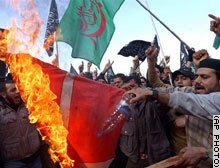

Muslim protesters target embassies. Demonstrators in Syria set fire to Norwegian and Danish embassies over a cartoon run in newspapers in those countries
IT WAS always intended to generate a debate about freedom of speech but, buried innocuously in the culture section of a newspaper, no-one guessed it would spark global protests, the burning of effigies and the unlikely cry of "Death to Denmark" Scotsman By ARTHUR MACMILLAN
The Last Word: Flemming Rose. Igniting More Than Debate
Why do you think Muslims are expressing such outrage now, when other religiously offensive cartoons have been published in the past?
"I think you have to separate this story into two parts. One part [is the debate inside Danish borders - that has been going on for four months. On the [one] hand, what does freedom of religion imply, what does respect for other people's feelings and religions imply? You have different points of view, and I think it's problematic if any religion - it doesn't matter if it's Islam, Christianity, Buddhism, any religion - tries to impose its own taboos on the public domain." Newsweek International Edition
Saturday, February 4
A play by Catherine Filloux about the man who coined the word "genocide," and his anguish over its toleration in the modern world, begins an Off-Off-Broadway run Feb. 3 at the 78th Street Theatre Lab.
Playbill via Yahoo
A U.S. District Court judge temporarily blocked the federal government from transferring an American citizen to the custody of the Iraqi government, noting Friday that the move could place the prisoner at risk of torture and indefinite confinement.
By Michael Powell Washington Post
Friday, February 3
The concept of religious satire as political commentary is certainly not restricted to any one religion. Usually the humor (often ironic in nature) is not aimed at the religious figures or ideas, but rather at irrational zealots and/or those unworthy disciples that commit atrocities in the name of their respective religion. Here are some examples.
Thursday, February 2




